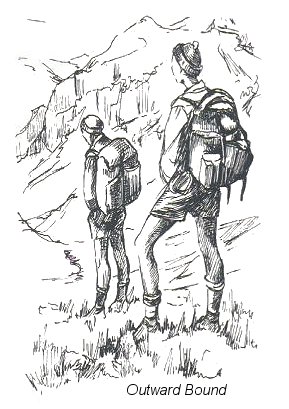
While the main road was being built and completed sections
slowly tarred, improvements were gradually made on local roads with widening and
gravelling and the replacement of gates by grids and of drifts by culverts and
bridges. About 1959 the Ministry of Roads took over the 27 miles from the
Nyahode main road bridge along the Nyahode valley, through Albany and up to
Misty Hill.
The Nyahode river on Westward Ho!, first crossed by a drift and then by
a causeway, was for many years a barrier in travelling when the river was
frequenfly too deep for weeks on end for normal passenger cars to get through.
One evening a family had an alarming crossing: at the approach the river did not
look too bad, and they drove in. When the wave in the middle washed right over
the headlights the only thing to do was to drive steadily on. The car stalled,
luckily well beyond the middle, and all piled out on the lower side of the car
and eventually managed to push it through, but it was an unpleasant experience
in the dark with the river swirling madly all round.
It was hoped for many years that the status of the V.M.B. would be raised
to that of a Town Management Board, but in 1960 the Government abolished Village
Management Boards, and the Melsetter Local Committee, witb even more restricted
powers, became the local authority and acted until the next change in Local
Government.
In a competition for the lay-out of the Arboretum 28 entries were
received from nine countries, and the thirty-guinea prize donated by Dr.
Alexander and B. D. Goldberg was won by a Leeds firm of Landscape Artists, and
it was hoped to plant attractive and interesting exotics and a specimen of each
indigenous tree which would support the climate, with each bearing a label
giving scientific data. By 1960 the area was fenced, a storage dam constructed,
two pools formed in the stream, paths demarcated, and over 220 trees planted.
The Arboretum Committee struggled on with maintenance but supervision was
difficult and funds were being used up. An appeal for more money was launched in
the hope of collecting a capital sum of �3 500 to yield interest considered the
minimum amount needed for the first seven years. The Arboretum, if completed,
would have provided instruction and pleasure to many, but the appeal met with
such a poor response that the scheme had to be abandoned.
Dr. Niblock retired as G.M.O. and for about two years Melsetter had no
resident doctor and Chipinga G.M.O.s came once a week to see patients. With no
doctor, no district nurse, and no Clinic Melsetter was very badly served, and
the position led to many protests by official bodies. The Government then rented
the W.I. Committee room as the G.M.O.�s consulting room for a year, and work was
started on a Doctor�s house. By the time it was completed, Dr. Helen Godwin was
the G.M.O. and running the practice from her home at Silverstream with the
surgery in one wing of the new house. Towards the end of 1960 the Government
took over the Camping Site for the African Clinic which is run by a fully
trained nurse under the supervision of the G.M.O.
The Post Office was gradually expanded; the next-door front room on the
verandah was taken over for postal sorting. Post boxes were installed, and an
Exchange room was built on to the end of the Government building. The
Postmaster�s hours on duty depended on R.M.S. arrivals and departures: besides
the normal hours he worked on three days a week till 6.30 p.m. if the buses were
not late, but mail was frequently sorted by the light of pressure lamps; on the
other three weekdays he made up mailbags for the R.M.S. from 6 a.m.
Heavy capital expenditure took place on the B.S.A. Co.�s Charter
Estates when outlay in excellent housing for all employees and an extensive road
network kept pace with afforestation. Schools, a clinic, a community hall,
offices and self-dependent workshops kept two builders busy over five
years.
Members of the Capricorn Africa Society in Melsetter realised the need
to develop the domestic efficiency and elementary citizenship of rural African
women in areas not already reached by others working in the Homecraft field.
Tremendous efforts were made by a small local group who raised enough money to
equip a Land Rover and to pay its staff and running expenses. Colonel Laurens
van der Post gave the Land Rover he had taken on his Kalahari Expedition, and
the service known as Kalahari Kate was started.
The work entailed driving some 1 000 miles a month into the Reserves over
the roughest roads. Twenty-two communities were visited once a month, and the
women paid ld a visit towards expenses and were encouraged to meet each week.
The work expanded, and homecraft training is given today by the team of two to
42 Clubs and six Youth Groups, and the programme now includes Area Days and
Training Courses in farming, leadership, and tackling local problems.
Most Clubs make money from running small rural industries, and at Mutambara
the C.M.U. started the first women�s co-operative in Rhodesia, the successful
Kumboedza Co-op. The C.M.U.�s success led to other official bodies starting
similar services with units which now cover a great part of the country, and the
C.M.U. experience in co-ordinating Clubs of various organisations led to its
advice and assistance being sought in the formation of the Women�s Group Liaison
under the Rhodesia Council of Social Service. The Committee is convinced, after
ten years� hard work and experiment, that it has been possible to achieve so
much and now to consider a much wider range of activities because it has
concentrated on regular instruction in a comparatively small area. The
achievements of the women themselves are many, lasting and growing.
At Melsetter Country Club in the early 1960s some progress was
apparent. A nine-hole golf course was laid out and planted to grass, the Golf
Section was formed, and in 1964 fairways and greens for five holes had been
planted and the first official golf match was held on home ground. Since then a
small band of enthusiasts has battled to keep the nine holes of this scenically
lovely course going.
In 1961 weekly children�s tennis was started during school holidays, an
excellent service which, with the coaching and encouragement given, led to the
children�s standard becoming very high.
Improvements to the Club house were badly needed, but the
Club was in the doldrums and, in spite of members working very hard to keep it
going, no spare money was available or could be expected and it was difficult
even to find the money required to carry on and to pay interest on loans from
members. The B.S.A. Co. helped with a large loan, materials and advice, and the
hoped-for alterations were carried out in 1962.
A swimming pool was donated, which is very much appreciated and is a
popular spot on warm days for adults and, whatever the weather, for children.
The children�s playground was equipped in 1963, and in 1968 the Club finances
were helped with a substantial gift from a member who was leaving the
district.
Re-arrangements in Government administration were made in 1962, and
Melsetter�s senior Government post became that of District Commissioner, whose
office was staffed with a District Officer and several clerks.
On a tiny plateau beneath the
craggy peaks of the Chimanimani
Mountains, in beautiful rugged country ten miles from the village, Melsetter
Outward Bound Mountain School was established in 1961. Its motto is �To serve,
to strive and not to yield.�
Outward Bound aims to give boys and young men of any race and from all
walks of life the chance to discover their potential for high moral and physical
performance under arduous and adventurous, yet carefully controlled, conditions
which challenge their capacities to the limit. Under these stimulating
circumstances a lad develops his capacity for facing hazards, difficulties and
hardships, and learns through contact with others under the same stresses the
virtues of self-discipline, teamwork and social responsibility.
The Melsetter School is unique among Outward Bound Schools in that it
caters for all age groups, from 13 to 60, and both sexes. Courses run all the
year round, with school holiday courses for Junior Boys from 13� to 19 and one
for Girls from 16� to 19; Standard courses for men between 19 and 30; Senior
courses for men over 30; and a Women�s course for the over 20s. To ensure that
no one is left out, an annual Natural History Excursion caters for any age group
and participants are taken into any area of their choice in the mountain and
given the opportunity of following their inclinations in observation and study
of local flora and fauna.
On a Standard course the students are collected in Umtali, and after a
rugged four-hour lorry ride they are glad to find that the first thing on
arrival is a swim. The clear, inviting water of Tessa�s Pool, fed by a
spectacular waterfall, is icy cold, and a swim there is the first assignment
each dawn.
Each course is divided into patrols of eight under an instructor.
Initially each patrol has a different captain each day, responsible for
leadership, discipline and welfare of his patrol, but about mid-course students
elect their own captain for the remainder of the course.

Inhibitions soon break down when living and working together. and a
cross-section of personalities, wills, abilities and misgivings, is mixed
together. The staff has found that the larger the course and the more varied the
individuals� backgrounds the better. The students are presented with mental and
physical challenges which will, at some stage, test every man to his limit. They
learn that with the correct mental approach anything is possible and that good
teamwork coupled with consideration for others are the keys to success.
The early part is devoted to physical toughening and basic training in
camp. On an elaborate rope course strung between trees students do a Tarzan act
on a liana-like nylon rope, and they undergo full basic instruction in rock
climbing and rope work on nearby cliffs. There is map-reading, compass work,
first aid, and mountain rescue. Cross-country running, ball games, orienteering
and evasion exercises, all serve to fill a very full working day which starts at
5 a.m. in summer and 5.30 in winter.
The culmination of the day is a session on the circuit training course
which is completed by 5.30 p.m., giving students a well-deserved break until the
evening meal at 6.45 p.m. In the evenings there are discussions or talks.
Weather makes no difference to turning out, and it is only in very exceptional
circumstances that Outward Round is confined to camp by the elements.
The initial phase is the overture to what is euphemistically called a
quiet walk: two full days away in the mountains, when the patrol is accompanied
by their instructor who is able then to ensure that the men are fully conversant
with the essential techniques for operating in mountainous areas.
After this a five-day expedition enables students to show what they can
achieve on their own and points to powers of leadership and determination. The
trip covers distances of over 100 miles across some of the most spectacular and
difficult country in Africa, and in addition to normal hazards of any mountain
range, meetings with small herds of elephants are not infrequent.